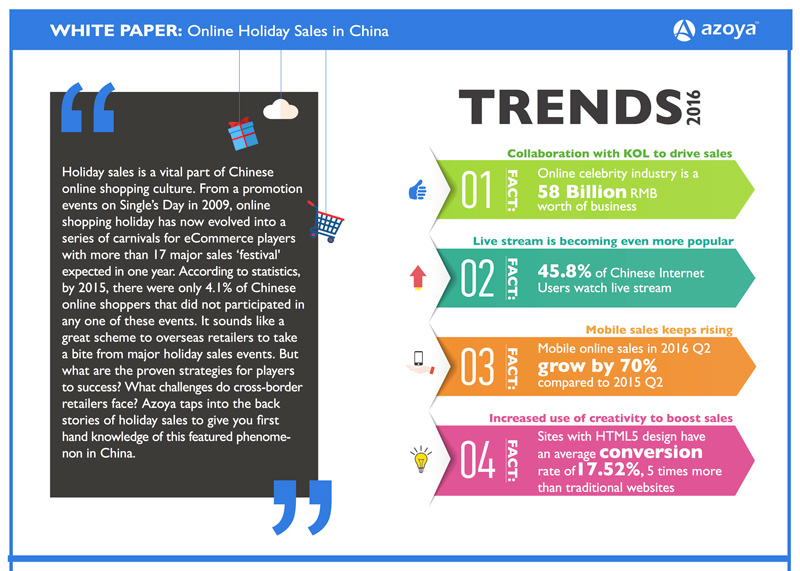3 Things You Should Know About Single's Day
Single's Day is the biggest online holiday sales event in the world, but how much do you know about it?
by Azoya

7 years ago, when online shopping festival was introduced in China on November 11, there were limited sellers on marketplace participated the events. However, on that Single’s Day alone, these sellers received 50 million yuan worth of orders, and it was no doubt a great success. Maybe it was coming out of jealous for those that enjoyed the taste of success for discovering this ‘new continent’, more merchants are rallying up for each year’s Double Eleven. Till now, Double Eleven is no longer an exclusive holiday of Ali owned marketplaces, but China’s biggest shopping carnival for shoppers and retailers both online and offline.
This year’s Double Eleven is just a few days away, and Chinese people are already in the mood of a shopping festival since October. Advertisement of this annual shopping events can be found everywhere — on the websites, in your WeChat moments, on the commuting buses and on the wall of a subway tunnel. Chinese online retailing giants are not letting go any opportunity to create an emerging experience of promotions and discounts. But will their effort mean anything after all? How will Chinese consumers deal with this event? How is the less-known part of this event — the logistics doing?
Marketing costs soars during Double Eleven
To a certain degree, the so called online shopping holiday is closer to a holiday for advertisement publishers. To make sure that consumers will be surrounded by orchestrated news and stories before November 11, online eCommerce giants set out as early as July to purchase external media channels and distribution channels. In 2013, major eCommerce players spent more than 1 billion in advertising from all media channels, and that figure is continuing to rise. Marketplace operators will purchase external display channels and offer them free to qualified marketplace vendors, in an effort to drive sales and hopefully recover the investment from commission fees. Non-marketplace eCommerce giants are also employing comprehensive solutions to acquire new buyers through massive advertisement and encourage old customers to consume again for incentives. Take VIP.com for example, with as much as 40% of direct visit to back sales, their investment in traffic acquisition is mainly at major portal sites, while social media, email marketing and text messaging are employed to attract old customers to consume again on Double Eleven. For medium and small eCom vendors that are not in the marketplace, they are left with expensive and limited channels to publish their discount information to high-quality consumers, forcing them to turn to a different strategy to recover ‘missing’ traffic, such as investing more in current channels and self-owned social media outlets.
If we can put the entire holiday sales into an equation with sellers and consumers on different sides and assumes that the values of each side stay the same, then the rising cost of traffic acquisition means that each side of the equation, sellers or consumers, are to bear the extra cost. Consumers are not benefited from the discount because the prices are manipulated in the first place to accommodate extra costs, or the sellers are paying more from their margin. Scaling up the events is a way to sustain this equation as more consumers will join the event and more products will be sold to cover the increasing traffic acquisition cost. While most of us won’t be concerning too much on the balance of this grand equation, but it is worth a thinking how a shopping holiday was hijacked by media sellers.
Yes, Consumers are still attracted to holiday discount
A recent research released by Jingdong (JD) has suggested that different generation of online shoppers have different reactions towards discount during Double Eleven. Generally, 80% of the consumers are sensitive to discount. The post-80s has the highest discount sensitivity in 2015, while in 2013 and 2014 their interest in pursuing discount was significantly lower. The post-70s ranks second in 2015 and throughout the years they are getting fond of purchasing discounted products. However, the post-90s displays lower discount sensitivity and their interest in discounted product were descending from 2013. The research shows that as consumers grow older and undertake more responsibility, they will become more price sensitive.
Although consumers are encouraged to shop online on Double Eleven with all the subconscious indications say that consumers will bound to be benefited from purchasing online on November 11, consumers are becoming more rational when making shopping decision, and statistic has shown that older generation is even more conscious in such orchestrated festival.
Logistics is under great pressure during holiday sales
Heavy investment in the inventory in a wish that goods will be sold to customers in 24 hours sounds like a naive idea, it is a strategy employed by many marketplace vendors. Some vendors started as early as June to do packaging for products prepared for Double Eleven, as sources tell.
High order volume in less than 24 hours is definitely placing a huge pressure on logistics. With continuous investment in infrastructure, warehouses of most major retailers and service providers are less likely to encounter “overload situation” like they use to 2 years ago. It was estimated by China Federation of Logistics and Purchasing (CFLP) that 1 billion parcels will be shipped during this year’s Double 11 shopping event. Service providers are resorting to the use of big data analysis, improved service and increased investment in capability building to optimise and improve overall efficiency. In a sense, Chinese online shopping events have been driving logistics enterprises to upgrade facilities and technologies to meet the annual peak.
With the rapid development of logistics infrastructure, service providers, as well as retailers should also be aware of potential problems and eliminate risks in early buds. Recent news report of an explosion took place in a production plant alerted practitioners of the safety issues that their businesses may possess. In 2013 and 2014 there were also reports saying that major warehouses in Tianjin and Guangzhou burst into flames and burning valuable inventories to ashes. In one hand, logistics and retailers are attempting to control the cost of warehousing, on the other hand, poor condition of the warehouse will greatly enhance overall risks.
Summary
Double Eleven is one of the most successful online holidays in the world, and the booming of holiday sales has great influence on the ecosystem of eCommerce in China. Different participators of holiday sales — marketplace owners, vendors, consumers and service providers, have their own role during holiday sales. Azoya will be publishing a White Paper discussing in-depth about Chinese holiday sales this November.

